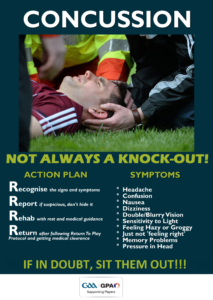More Information
What is Concussion?
Concussion is a brain injury and can be caused by a direct or indirect hit on a player’s head or body. Concussion typically results in an immediate onset of short lived signs and symptoms. However, in some cases, these signs and symptoms may evolve over a number of minutes or even hours.
If there are any signs leading to the suspicion of concussion, a player should be removed immediately from the field of play pending a full medical assessment (the impact itself may on occasion be considered an indicator even in the absence of any immediate symptoms).
A player suspected of sustaining/having sustained a concussion should not return to play on the same day. Subsequently a satisfactory, supervised return to play protocol must be completed, followed by medical approval, prior to return to play.
If In Doubt, Sit Them Out
SIGNS AND SYMPTOMS
Contrary to popular belief, most (over 90%) concussions occur without a loss of consciousness and so it is important to recognise the other signs and symptoms. Concussion must be recognised as an evolving injury in the acute stage. Some symptoms may develop immediately while other symptoms may appear gradually over time. Monitoring of players – minutes, hours and days – after the injury is therefore an important aspect of concussion management.
If there are any signs leading to the suspicion of concussion, a player should be removed immediately from the field of play pending a full medical assessment (the impact itself may on occasion be considered an indicator even in the absence of any immediate symptoms). A player suspected of sustaining/having sustained a concussion should not return to play on the same day. Subsequently a satisfactory, supervised return to play protocol must be completed, followed by medical approval, prior to return to play. If In Doubt, Sit Them Out.
Concussion in Gaelic Games – Overview
- Concussion is a brain injury which results in a disturbance of brain function and can be caused by direct or indirect contact to the player’s head or body. It needs to be taken seriously to protect the short and long-term health and welfare of all players.
- There are many symptoms of concussion, common ones being – headache, dizziness, memory disturbance or balance problems. Loss of consciousness occurs in less than 10% of concussions and is not a requirement in diagnosing a concussion.
- It should be noted that the symptoms of concussion can present at any time but typically become evident in the first 24-48 hours following a head injury
- Athletes with a history of two or more concussions within the past year are at greater risk of further brain injury and slower recovery and should seek medical attention from practitioners experienced in concussion management before returning to play.
- Concussion is an issue that affects all sports and it is important that everyone involved in Gaelic Games recognises the symptoms of concussion and removes from playing or training any player with clear or suspected symptoms.
- The key message is – Recognise & Remove. Recognise the symptoms of concussion and permanently remove a player displaying any of those symptoms from the game or training session.
- Below you will be able to access a suite of resources, some targeted at medical personnel and others at those without medical training, which should be utilised by everyone involved in Gaelic Games – players, parents/guardians, coaches, administrators, referees and medics to ensure the welfare of all players at all levels of our games.
- Everyone involved at any level of Gaelic Games is encouraged to complete the short educational module available here – Click Here For Module
Information for Coaches & Parents of Young Players
Concussion Information for Players (Age 5-18)
Click for Ulster GAA Concussion Awareness
For more information visit the GAA Website.
CONCUSSION MUST BE TAKEN EXTREMELY SERIOUSLY







